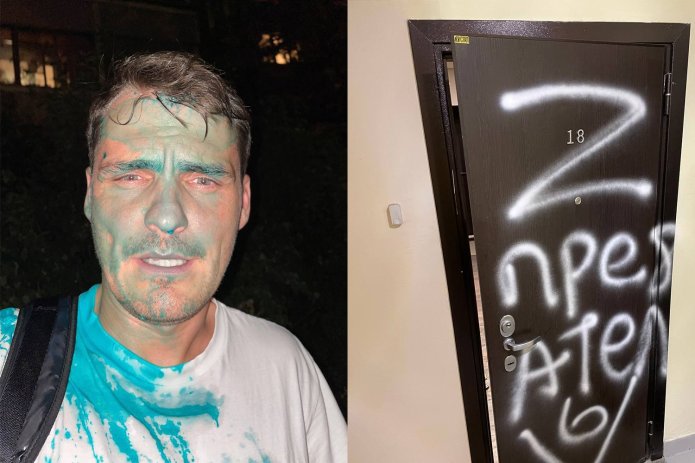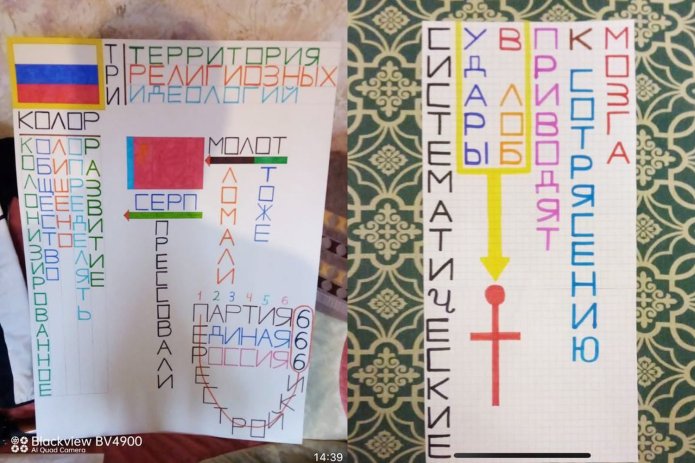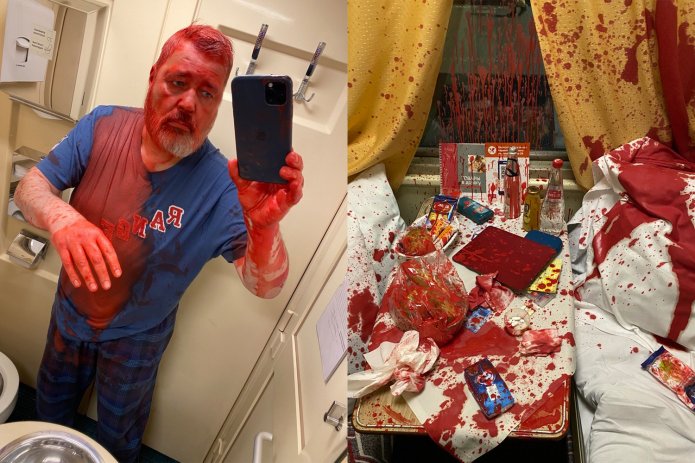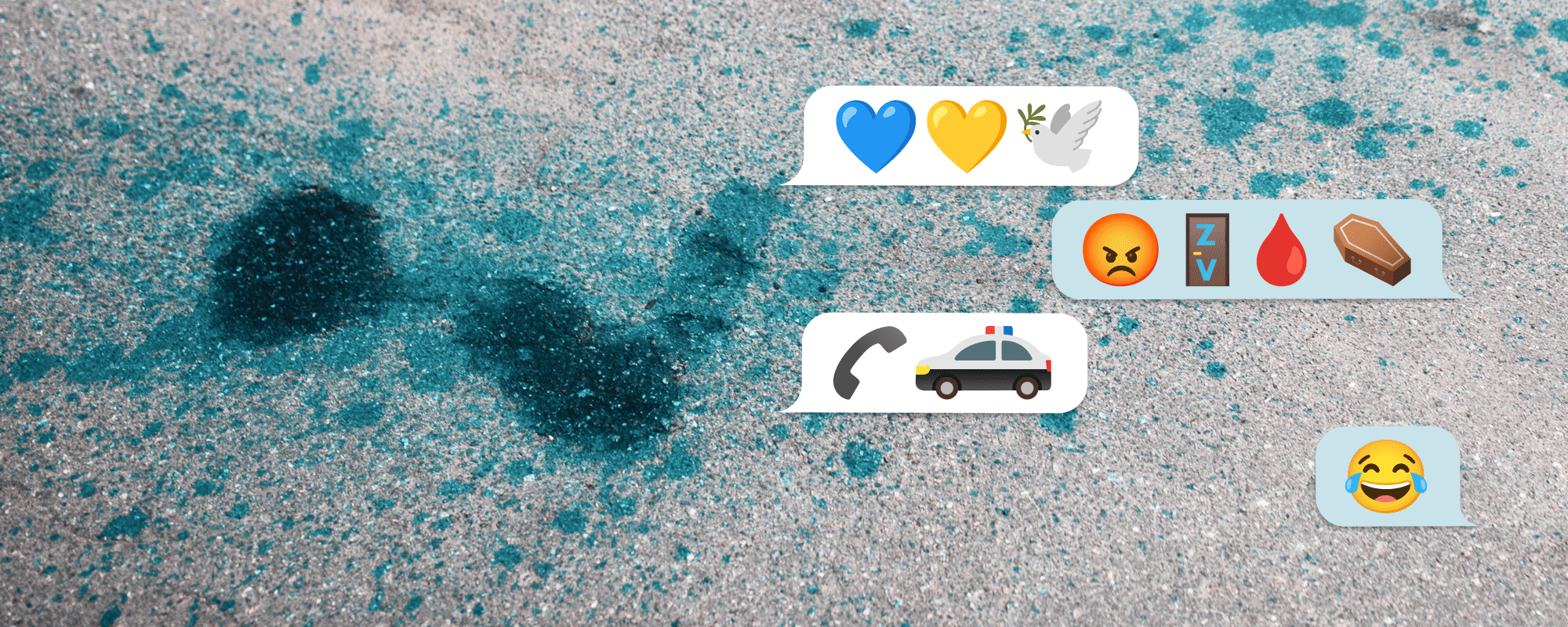Since February 24, Russians protesting against the war have faced not only arrests, criminal proceedings, and dismissals, but also non-state pressure. Unknown people paint their apartment doors with the letters Z and V, splash them with brilliant green, and send them threats on social networks. We explain with examples and figures what this expanding trend is.
On August 18, unknown people poured brilliant green on a local resident Mikhail Baranov in Moscow. Before that, in March, a man was detained at an anti-war rally on Manezhnaya Square. From unknown Instagram accounts, Mikhail received insults and threats, and in July someone wrote «traitor» on the door of his apartment.
«I came home and parked the car where I always park it. I went up to the apartment with my wife. Then I had to go grocery shopping, and I went down again. The car was parked not far from the forest belt, and when I approached, a man jumped out and splashed brilliant green at me. I shouted, trying to attract attention, but everything happened so quickly that I didn’t even have time to see [the attacker]. He disappeared. I wiped my face and called the police. They arrived in five minutes, » the man recalls.
The police put forward the theory that an old friend of Baranov’s or a lover of his wife could have splashed brilliant green at him. Mikhail was taken to the police department in the Mitino district, where he wrote a statement about the attack. Law enforcement officers promised to respond within ten days but did not respond.
«When I called the police because someone had written „traitor“ on the door, they didn’t really want to investigate it. They didn’t care what had happened, » Mikhail says. «They mostly laughed at me, suggesting that maybe I had fought with a neighbor. Then they said that there was a camera in the entrance, but it was allegedly „very difficult“ to view images from it.»

Despite the obvious reluctance to investigate the case, they still accepted the statement on the inscription on the door from Baranov and promised to sort it out. Mikhail received the answer 30 days later. The police reported that «it was impossible to identify bystanders and witnesses of the incident,» as well as to find the person who had written the word on the door. The police refused to open a criminal case, and only an administrative case was initiated under the article on petty hooliganism (Article 20.1 of the Administrative Code).
After the attack with brilliant green, once again, the police refused to start a case. In the refusal decision, the law enforcement officers wrote about the absence of witnesses and that the incident had not been recorded by the surveillance cameras.
Mikhail believes that everything that keeps happening to him is connected to his anti-war position. On March 2, he was fined 20 thousand rubles under the article on violation of the picketing procedure (Part 5, Article 20.2 of the Administrative Code) due to participation in an anti-war rally. After that, he no longer participated in protest actions but continued to publish posts with anti-war statements on social networks.
«I was constantly confronted with various claims and threats on Instagram after my posts. I have been posting a lot of things in recent days, including explosions and photos of war crimes. Some strangers wrote: «Are you a Nazi, aren’t you ashamed to post such nonsense? Face it, why are you looking at everything so one-sidedly. You don’t value your life, do you think it’s difficult to find you?», — Mikhail says.
Immediately after the attack, he received a text from an unknown number on WhatsApp. The message included a rebus consisting of the words «Hammer and Sickle», «United Russia», «Moscow», «Orthodoxy», «Jesus», «Christ», «Putin» and «Kyiv-Rus». Mikhail did not understand what exactly the sender wanted to say with this.

Mikhail Baranov is far from the only one who has faced this. In July, unknown persons hung a funeral wreath, a poster «Traitor be afraid» and the letters Z and V on the door of an activist from Kaliningrad, Kirill Sukhorukov. In addition, they left two photographs of Sukhorukov at the door, one of which was crossed out with a red cross.
In June, leaflets with insults were glued to the apartment door of Oleg Klimenchuk from St. Petersburg, and he and his wife began to receive threats on social networks. In particular, unknown people threatened Oleg’s children, ridiculed his appearance, and used obscene language. All this happened after Klimenchuk went on an anti-war picket with quotes from Robert Rozhdestvensky’s poem Requiem on a poster.
In April, Dmitry Muratov, editor-in-chief of Novaya Gazeta and Nobel Peace Prize laureate, was attacked in a train compartment. The attacker doused the journalist with red paint, shouting: «Muratov, here’s to you for our boys!» After that, the head of Novaya Gazeta was diagnosed with eye burns and conjunctivitis. In July, it became known that the police had not opened a criminal case.
Later, Novaya Gazeta conducted an independent investigation and released the alleged names of the attackers. According to the newspaper’s journalists, «these people are closely connected, they are in contact with nationalist and „patriotic“ structures, as well as security services.» According to the investigation, the attack involved a former member of the Russian nationalist movement Nikolai Trifonov, and Ilya Markovets, an adviser to the chairman of the board of the Russian Union of Reserve Officers Enrico Todua. The Union of Reserve Officers actively cooperates with structures from the Donetsk People’s Republic (DPR).

OVD-Info is aware of at least 93 cases of non-state pressure on people in connection with their anti-war position. 14 people faced direct attacks, 22 people began to receive threats, and in 57 more cases property was damaged (most often in the form of painting on the walls of building entrances or apartment doors). OVD-Info analysts are preparing a report to the UN Human Rights Committee with a detailed analysis of the trend.
The fact that there is more non-state pressure than before the war has also been confirmed by the director of the Public Verdict Foundation Natalia Taubina. The Foundation monitors human rights violations in Russia not only by state institutions but also by «pseudo-policemen».
By «pseudo-policemen» or «vigilantes» Public Verdict means groups of citizens who unite to fight a certain «vice». A «vice» can be a violation of traffic rules, drinking alcohol in public places, and drug trafficking, as well as «extremism» on the Internet, violation of consumer rights, illegal emigration, abortion, or opposition activity. Vigilantes endow themselves with the functions of law enforcement agencies, claiming that the police themselves do not cope with their duties. According to the Foundation, in recent years, the phenomenon in Russia has not only been rapidly developing but also has received, directly or indirectly, the support of the authorities.
In their work, pseudo-policemen use various methods: they organize raids, counteract events, catch violators, intimidate them and force them to obey the law. Often, law enforcement officers eventually detain both vigilantes and those from whom they tried to «protect» society. Pseudo-policemen, however, are often later released without any consequences.
According to Public Verdict, the special attitude of law enforcement officers to such activists is most strikingly manifested in situations when victims of vigilantes are trying to open a criminal case against them. Usually in such situations, the police make it clear that they are not interested in investigating. According to the foundation’s statistics for 2019, in 845 cases of violence by vigilantes, law enforcement officers sided with them, and only in 45 cases the police did not support them or did nothing.
«I do not know of a single case when the investigative authorities would have tried to do something about the painted doors, and such actions would be thoroughly investigated, and the perpetrators brought to justice. However, as soon as [anti-war] graffiti appears somewhere, activists are immediately detained. This is an absolutely obvious signal from the authorities that violence can be used against activists and there will be no punishment for it,» Taubina says.
Karina Merkuryeva



